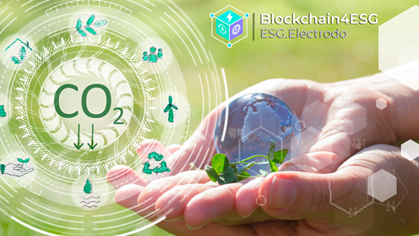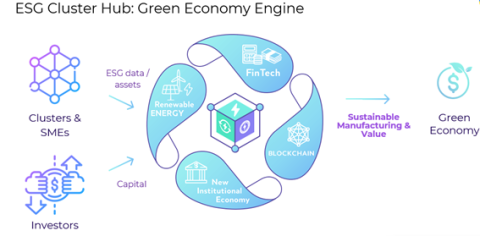ESG Cluster Hub
Established in 2013, 482.solutions is a Singapore-based international company with headquarter in Ukraine, specializing in the development of industrial Web3 and blockchain-based solutions for the Green Energy, Green Fintech, and Sustainable Value Chain sectors. Electrodo is a flagship product of 482.solutions.
Electrodo is a Web3 platform for ESG data and asset management, helping industrial SMEs, clusters, and investors create sustainable value and improve the efficiency of sustainable capital allocation. Electrodo solves the problem of ESG data integrity and reliability for climate-related risk assessment and management, as well as contributes to the industrial resilience and sustainability.
ESG Cluster Hub is a clusters-focused implementation of Electrodo in Smart Agrifood. ESG Cluster Hub empowers industrial clusters and SMEs with Data Space and digital services for effective ESG strategy implementation and green transition.
What are the benefits of the ESG Cluster Hub?
For Industry (Clusters):
- A registry of industrial initiatives and projects related to the rebuilding of Ukraine's post-war economy.
- Focuses on fostering resilient and sustainable industrial clusters and SMEs.
For Investors:
- Provides a source of trust and reliable ESG data for investors.
- Facilitates ESG and green finance investments by ensuring comprehensive and verifiable ESG assessment.
Challenge
Related climate change challenges are driven partly by the potential for threats to human health, infrastructure, natural resources, energy security, and even international order. Moreover, widely-accepted climate scenarios present critical economic and financial issues.
Solution
The goal of ESG Cluster Hub is to implement the methodology and develop a digital solution for data value creation that drives and accelerates the transition of industrial SMEs in the Agri-Food Industry to a low-carbon economy. This will be achieved through the implementation of ESG principles based on climate-related data and risk management framework TCFD Recommendations, as well as by carrying out an experiment on the collection, structuring, processing, and sharing (disclosure) of financial material ESG data between the participants of the Agri-Food value chain.
First results
- Developed a model of a recursive cluster and sustainable economy
Deployed the first European ESG Data Space platform, aligning with the European data strategy and the Gaia-X initiative, end-to-end ESG data processing and reporting CSRD regulations and facilitating ESG data-enabled value chains.
Demonstrated the feasibility of creating a recursive cluster economy utilizing Data Space and blockchain technologies
Implemented a cross-border pilot project in the Agri-Food sector, demonstrating the collection, reporting, verification, and exchange of ESG data between cluster member organizations and DIH from Spain and Ukraine
Engaging (through UCA) new clusters in Agri-Food, Energy and Construction
Potential for transfer:
- European alignment: aligning with the European data strategy, Gaia-X, CBAM, and CSRD regulations ensures compliance and market readiness, a replicable strategy for other regions.
- Scalability: the recursive cluster economy model and ESG Data Space are scalable and can be tailored to various sectors and contexts.
- Cross-border transfer: the cross-border pilot in the Agri-Food sector between Spain and Ukraine serves as a blueprint for international ESG initiatives.
- Innovative technology: the integration of FIWARE, blockchain and the ESG.Electrodo platform provide a reliable method for ESG data management and reporting, adaptable by other regions.
From the perspective of cluster Good Practices, the ESG Cluster Hub is the #1 project in Ukraine that integrates the best cluster approach to managing industrial ecosystems with a comprehensive technological platform available to all clusters.
CEO of UCA Alexandre Yurchak highlights that on the one hand, ESG Cluster Hub is quite an advanced solution for the majority of Ukrainian SMEs. Most of them lack skills and culture in twin transition. On the other hand, some of them already have demands on ESG reporting during export in EU countries, which is still more relevant for those who aim to be integrated into EU value chains. So, we are enthusiastic about the future of this solution, and we believe it is the perfect one for the clusters as it is based on the natural concept of the supply chain for clusters.

